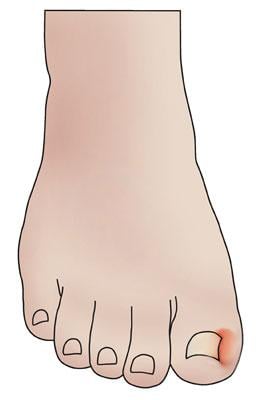Ingrown Toenail Treatment, Prevention, and Causes
What is an ingrown toenail?
An ingrown toenail, also known as onychocryptosis, is a painful condition characterized by the nail digging into the surrounding skin. This could lead to inflammation and possible infection of the toe.
This is a serious condition for people with impaired circulation, diabetes, or other systemic diseases.

Symptoms
The most common ingrown toenail symptom is pain, especially if the area becomes infected. The surrounding skin might be deep pink and release a discharge or pus. The skin might appear raw with a red, moist lump overlapping the nail edge.
Causes
What causes ingrown toenails?
- Heredity - The passing on of toe and foot traits from parents to their children.
- Improper nail trimming - Allowing toenails to become long, using dull nail clippers or trimming too close to the skin.
- Trauma - Damage to the toe and toe nail, especially the sides of the nail.
- Shoe pressure - Improper fitting shoes and cramped toes.
- Poor foot structure - Bone, muscle and tissue irregularities.
Prevention
How do you prevent ingrown toenails?
- Trim toenails straight across as a preventative measure
- Select the proper shoe style and size.
Treatment
How do you treat an ingrown toenail?
When you notice the ingrown nail, soak your foot in warm water containing antimicrobial soap, or a few tablespoons of salt. Dry your foot and apply an over the counter antibiotic ointment and a clean dressing.
How to cut an ingrown toenail?
Do not cut the ingrown nail. For the next few days, wear open toed or loose fitting shoes. When the nail grows out, cut it straight across with toenail clippers. More advanced ingrown toenails require the attention of a healthcare professional, such as a podiatrist.
Links to recommended PediFix® Products:





